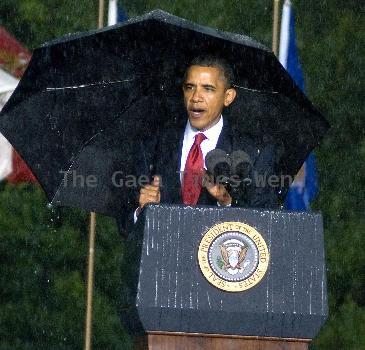Ariz. police told to expect opponents to videotape, scrutinize enforcement of immigration law
By Jonathan J. Cooper, APThursday, July 1, 2010
AZ cops expect scrutiny of immigration enforcement
PHOENIX — Police enforcing Arizona’s toughest-in-the-nation immigration law are allowed to consider if a person speaks poor English, looks nervous or is traveling in an overcrowded vehicle.
They can even take into account whether someone is wearing several layers of clothing in a hot climate, or hanging out in an area where illegal immigrants are known to look for work.
But top police officials issued a stern warning to officers Thursday, telling them in a training video not to consider race or ethnicity and emphasizing that “the entire country is watching.”
The officials cautioned that opponents of the law may secretly videotape police making traffic stops in an effort to prove that they are racially profiling Hispanics.
“Without a doubt, we’re going to be accused of racial profiling no matter what we do on this,” Tucson Police Chief Roberto Villasenor tells officers on the video, which was posted online. The recording demonstrates how officers should determine when they can ask someone for proof they are in the country legally.
Arizona’s law, sparked by anger over a surging population of illegal immigrants in the border state, generally requires officers enforcing another law — like speeding or jaywalking — to question a person’s immigration status if there’s a reasonable suspicion that the person is in the country illegally.
Under the law, officers are also allowed to consider if a person does not have identification or tried to run away. But the stakes for making a mistake are high: Officers can be fired if they start asking questions because of a person’s race, then lie about it later, the video warns.
“It is also clear that the actions of Arizona officers will never come under this level of scrutiny again,” said Lyle Mann, executive director of the state agency that trains police. “Each and every one of you will now carry the reputation for the entire Arizona law enforcement community with you every day.”
The law applies only to a traffic stop, a person who is detained or an arrest — not when a person flags down an officer. Police are not required to ask crime victims or witnesses about their immigration status, and anyone who shows a valid Arizona driver’s license is presumed to be in the country legally.
“The entire country is watching to see how Arizona and in particular Arizona law enforcement responds,” Mann said.
The law restricts the use of race, color or national origin as the basis for triggering immigration questions. But civil rights groups and some police officials argue that officers will still assume that illegal immigrants look Hispanic.
Arizona’s 460,000 illegal immigrants are almost all Hispanic. Yet Arizona also has nearly 2 million Hispanics who are U.S. citizens or legal residents, about 30 percent of the state’s population.
In the training video, an expert advises officers to ask themselves whether they would reach the same conclusion about a Hispanic person’s immigration status if the subject were white or black.
“If any officer goes into a situation with a previous mindset that one race or one ethnicity is not equal to another’s, then they have no business being a law enforcement officer in this state,” Arizona Police Association President Brian Livingston said in the video.
To determine whether the person is legally in the United States, officers dealing with a suspected illegal immigrant are told to call the Border Patrol, a police officer certified to enforce immigration laws or a federal immigration hotline.
They are supposed to ask federal immigration authorities to come pick up illegal immigrants. If the feds refuse, officers can arrest immigrants or take them to a federal detention center.
The instructional video and supporting paperwork will be sent to all 170 Arizona police agencies.
Police departments will decide the best way to teach their forces. There is no requirement that all 15,000 Arizona police officers complete the training before the law takes effect July 29.
Law enforcement officials around the state said they were reviewing the training materials. Most hadn’t decided yet how to use them.
Sheriff Paul Babeu of Pinal County, home to smuggling corridors south of Phoenix, said he’s going to require all of his officers to watch the video, and he created a supplemental video with information specific to his agency.
“I have full faith and confidence in all of us as professionals to apply the law in a very professional way,” he said.
Stephen Montoya, a lawyer representing police officers suing to block the law, said the video is “a good introduction” but isn’t sufficient to train officers on immigration law.
“I thought it would be more detailed. I thought it would be more thorough. I thought it would be more expansive,” he said.
Gov. Jan Brewer ordered the Arizona Peace Officer Standards and Training Board to develop the training program when she signed the law April 23.
Opponents have challenged the measure as unconstitutional and have asked that a federal court block it from taking effect. U.S. District Judge Susan Bolton plans to hear arguments on the request later this month.
President Barack Obama on Thursday called the law an understandable byproduct of public frustration with the government’s inability to tighten the immigration system. But he also said it is ill-conceived, divisive and would put undue pressure on local authorities.
The law was passed in part with the lobbying muscle of unions representing rank-and-file police officers who argued that they should be allowed to arrest illegal immigrants they come across.
It was opposed by police chiefs who worried it would be expensive to implement and would destroy the trust they have developed in Hispanic neighborhoods.
Associated Press video producer Yvonne Leow contributed.
Online
Training materials: www.azpost.gov/SB1070infocenter.htm
Tags: Arizona, Arrests, Barack Obama, Hispanics, Law Enforcement, North America, Phoenix, Race And Ethnicity, United States




